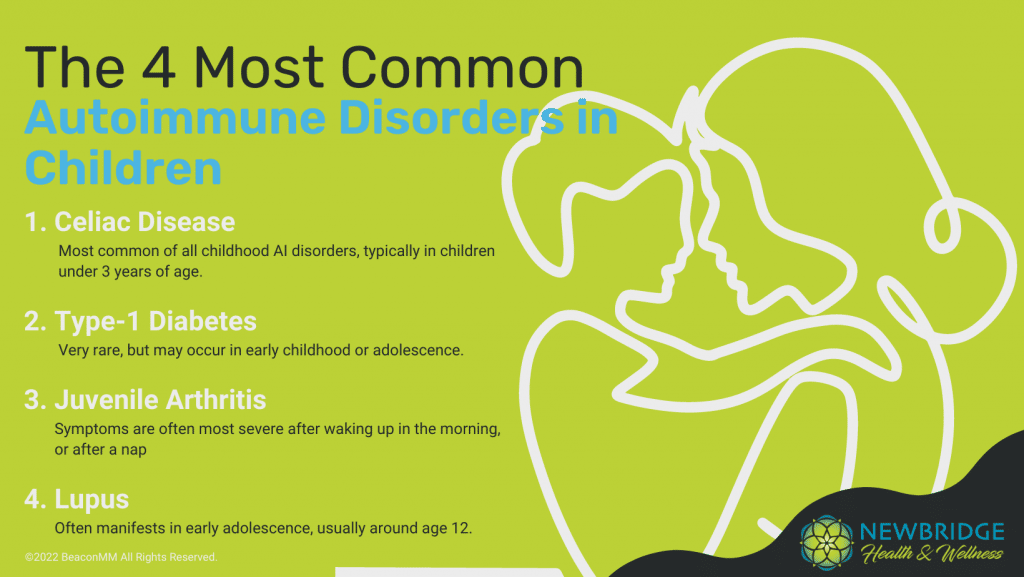Kids have it pretty tough these days. And if you think about it, life moves pretty fast when you’re young. Before you know it, you’ve gone from playing with blocks to solving math problems in grade school – then suddenly, you’re an adult with a pile of bills and responsibilities.
Childhood may hold some of the best times of our lives, and though much of childhood might seem carefree, when you add an autoimmune disorder into the equation, things tend to get a bit complicated – and scary – for both the child and the parent.
An autoimmune disorder in children is considered rare, but it’s important to know that these diseases are on the rise. As a parent, it’s also important that you’re aware of the signs and symptoms of these diseases so that you can seek a proper diagnosis and treatment for your child.
If you’d like to learn more, or if you believe that your child may have an autoimmune disorder, contact the experts at Newbridge Health & Wellness today.
What Is an Autoimmune Disorder?
Autoimmune diseases occur when the body’s immune system begins attacking healthy cells. And though our immune systems can usually differentiate foreign bodies such as viruses and bacteria from healthy cells, the hallmark of an autoimmune disease is that the immune system mistakes parts of the body as being foreign – and then begins attacking them.
Currently, there are about 80 to 100 known autoimmune diseases, but the list is also growing. A few autoimmune disorders you may be familiar with are as follows:
- Rheumatoid Arthritis
- Celiac Disease
- Lupus
- Sjögren’s Syndrome
- Multiple Sclerosis
- Polymyalgia Rheumatica
- Type 1 Diabetes
- Alopecia Areata
- Vasculitis
Though research has been extensive, medical professionals do not know exactly what causes the immune system to attack the body. And as mentioned, autoimmune disorders are on the rise in children. This has given researchers some reason to believe that both environment and diet may play a significant role. However, no conclusive evidence has been found as of 2022.

Autoimmune Disorders in Children
Aside from Celiac Disease, most pediatric autoimmune diseases are uncommon. However, autoimmune diseases in children often prove to be the most challenging for providers who practice functional medicine.
When treating autoimmune diseases in children, providers often take a collaborative approach with both diagnosis and treatment in order to give a more thorough evaluation. This process may also involve specialists with specific training in treating these types of disorders in children, along with a primary specialist who directs the treatment and guides the effort of all caregivers.
The four most common autoimmune diseases in children include the following:
- Celiac Disease
- Type-1 Diabetes
- Juvenile Arthritis
- Lupus
Each autoimmune disease referenced above attacks the body in a different way. And in order to know if your child has a specific type of autoimmune disorder, it’s helpful to know a little about each – and its identifying symptoms.
Celiac Disease
Celiac disease is the most commonly diagnosed autoimmune disease in children – more commonly associated with children aged 3 or under. It’s also important to note that this disease typically occurs after wheat or gluten is introduced to the child – usually when a child is between six to nine months old. However, some children may develop the condition several years later.
If you suspect your child may have celiac disease, he or she may exhibit one or a combination of the following symptoms:
- Decreased appetite
- Constipation
- Colic
- Diarrhea
- Bloating
- Abdominal pain (cramps)
- Nausea
- Vomiting
- Fatigue
Severe cases of celiac disease in children may begin first with diarrhea that persists day after day. And weight loss or dehydration typically follows. If this is the case, it’s important that you take your child in for a medical evaluation as there could be other underlying factors that could be contributing to the condition – and this is where functional medicine can play an important role.
Type-1 Diabetes
Type-1 Diabetes is also sometimes referred to as juvenile diabetes and typically manifests during adolescence. However, this condition can also be found in younger children, and it can also affect young adults.
This autoimmune disease is extremely rare. But type-1 diabetes occurs when your child’s pancreas makes little or no insulin, which assists blood sugar upon entering cells for energy conversion. It’s also important to note that unfortunately there is no known cure or prevention for type-1 diabetes.
Symptoms of type-1 diabetes in children may include:
- Extreme fatigue
- Stomach pains
- Nausea
- Vomiting
- Extreme thirst
- Weight loss
Though a cure is not currently available for type-1 diabetes, if you can handle your child’s diabetes care on a daily basis, your child may still be able to stay relatively healthy. This includes ensuring that they’re eating healthy foods and receiving proper nutrition, keeping up with insulin regimens, and keeping in touch with their healthcare provider frequently.
Juvenile Arthritis
For many years, parents commonly believed that children would eventually outgrow juvenile arthritis. However, this is a myth. Though some cases of remission are evident and have been documented, cases of this autoimmune disorder are typically long-lasting and may require treatment throughout life.
Juvenile idiopathic arthritis often causes frequent joint pain, swelling, inflammation, and stiffness. And additional symptoms of juvenile idiopathic arthritis often include:
- Fatigue
- Warmth or redness near joints
- Eye inflammation
- Swollen joints
- Stiffness
It’s important to know that your child’s symptoms may be the most severe after waking up in the morning, or sometimes after your child has taken a nap. Treatment may vary, but this often includes medications such as pain relievers, anti-inflammatory drugs, and antirheumatic drugs.
Lupus
Pediatric lupus is most commonly detected in children just as they begin to enter adolescence – typically around 12 years of age. However, cases of lupus in younger children have also been documented, though this is extremely rare – especially in children under 5 years of age.
When a child has lupus, this can cause severe joint pain, fever, rashes, and organ damage. Though much more severe in children, lupus affects children in many of the same ways that it affects adults. As such, lupus in children can involve multiple organs in more severe cases.
Children with Lupus may experience the following symptoms:
- Red rash on the cheeks and/or nose
- Disc-shaped rash with areas that appear raised
- Skin rash after exposure to the sun
- Hair loss
- Mouth sores
- Joint pain
In more severe cases, fluid buildup around the heart or lungs as well as kidney failure can manifest in children. And if your child is showing any symptoms, getting a professional diagnosis and treatment plan implemented early is going to be key to treating pediatric lupus as your child ages.
Treating Autoimmune Disorders in Children
Though treatments will vary depending on the type of autoimmune disorder your child has, a universal element to the treatment of all autoimmune disorders is the consistent adherence to the specific treatment regimen provided by your provider.
No parent wants to watch their child suffer from any illness. And with regular treatment, your child may have the chance at living a normal and full life despite his or her condition. But with autoimmune disorders in children, you have to be prepared to care for your child and keep up with any treatment plan that your provider recommends – and prepare to go the distance.
Functional medical practitioners focus on the root cause of a disease. And these medical professionals understand that there may be several underlying factors that contribute to your child’s illness. As such, if you suspect that your child may have an autoimmune disorder, or if they’ve exhibited any persistent symptoms consistent with an autoimmune disease, you should take them in for a medical evaluation immediately.
Want to learn more about how medical professionals can treat an autoimmune disorder in children? Contact Newbridge Health & Wellness and schedule an appointment today.


